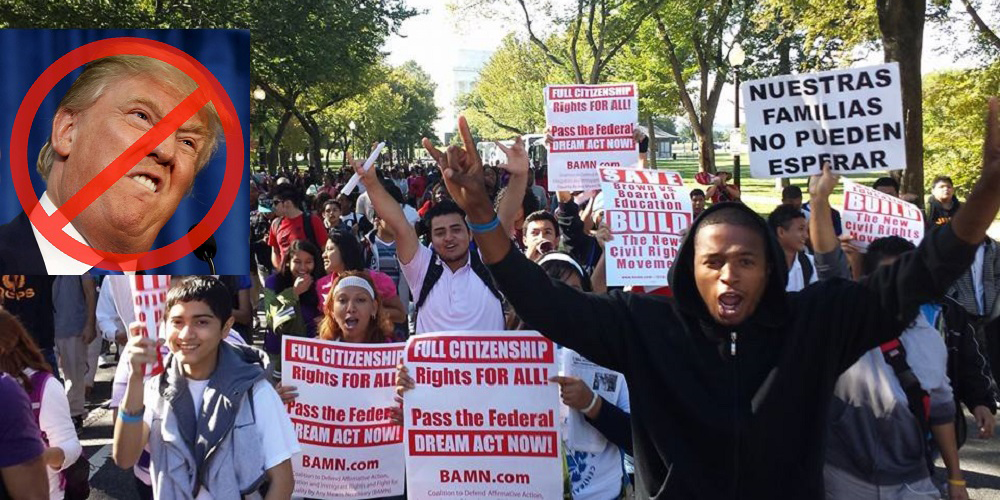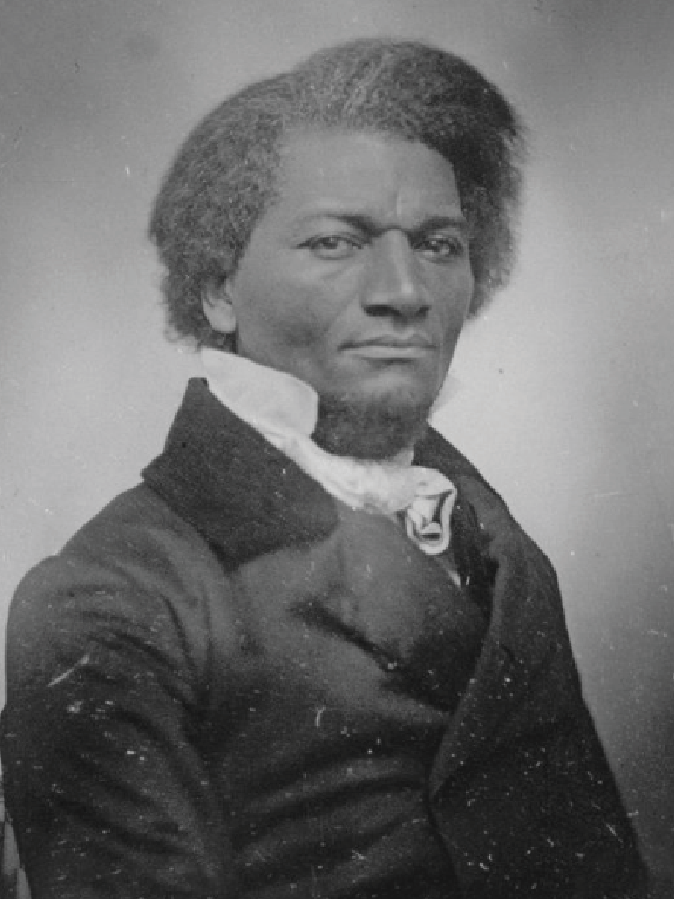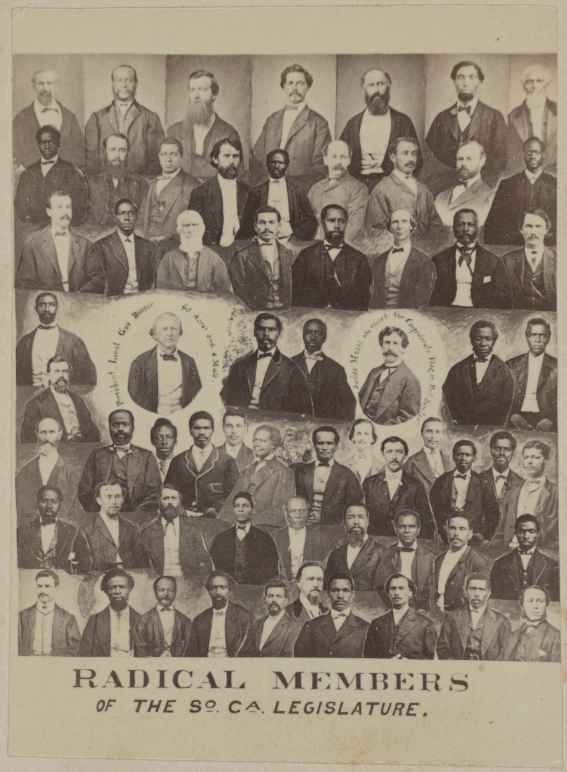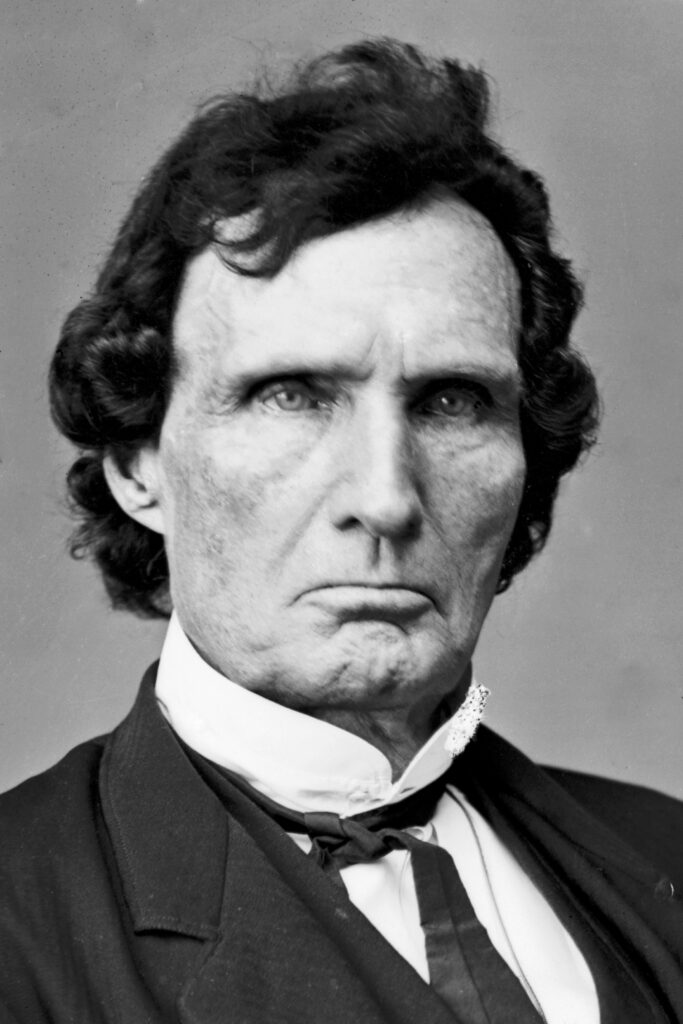
NATIONAL MOBILIZATION MAY 15 to the Supreme Court to defend birthright citizenship!
Rally Thursday, May 15 (day of oral argument), 9:00 a.m., before the 10 a.m. hearing.
U.S. Supreme Court (1 First St. NE, near East Capitol, Washington D.C., near Capitol South Metro station)
On April 29, 2025, the civil rights organization BAMN submitted an amicus brief (BRIEF BELOW) to the U.S. Supreme Court in the birthright citizenship cases Trump v. CASA, to speak on behalf of the National Resistance to Trump. It makes an argument no party and no other amicus curiae is presenting: that the Supreme Court must uphold birthright citizenship nationwide and not support Donald Trump’s “plan to make America a fascist nation.” It defends the original intent of the Fourteenth Amendment that was won out of the Civil War: to extend birthright citizenship, a founding principle of the country, to all people regardless of race, to prevent the restoration of a racist caste system in America.
Do the following:
- Attend the May 15 protest at the Supreme Court! Sign up at the Mobilize Event Page
- Organize and mobilize your members, students, and community to attend. Publicize the rally and help spread the word across your networks: Share the link to Mobilize Event Page
- Donate to fund transportation to DC
🔸Event: National Mobilization to Defend Birthright Citizenship
🔸Location: U.S. Supreme Court, Washington, D.C.
🔸Time: 9:00 AM – Wednesday, May 15
🔸RSVP & Info: Mobilize Event Page
Here is BAMN’s April 29, 2025 amicus brief to the US Supreme Court in Trump v. CASA and two other birthright citizenship cases. Footnotes have been added that include further sources and historical background that were used in developing our arguments.
IN THE SUPREME COURT OF THE UNITED STATES
DONALD J. TRUMP, et al., Applicants v. CASA, INC., et al., Respondents.
DONALD J. TRUMP, et al., Applicants v. WASHINGTON, et al., Respondents.
DONALD J. TRUMP, et al., Applicants v. NEW JERSEY, et al., Respondents.
On Applications for Partial Stays of the Injunctions Issued by the United States District Courts for the District of Maryland, the Western District of Washington and the District of Massachusetts
BRIEF AMICUS CURIAE OF B.A.M.N. (THE COALITION TO DEFEND AFFIRMATIVE ACTION, INTEGRATION AND IMMIGRANT RIGHTS AND FIGHT FOR EQUALITY BY ANY MEANS NECESSARY) IN SUPPORT OF RESPONDENTS
Identity and Interest of the Amicus Curiae
The Coalition to Defend Affirmative Action, Integration and Immigrant Rights and Fight for Equality By Any Means Necessary (BAMN) is an integrated, youth-led civil rights and immigrant rights organization committed to building the new civil rights movement.
BAMN has a strong interest in the case because the above-titled case will affect the rights of citizenship for all people including all immigrants.
Summary of Argument
The application for stay should be denied to prevent the American Catastrophe: Fascism from being enacted in the United States.
Argument
No case before the Supreme Court, now or in the foreseeable future, is more important than this case. This case will settle the question of whether the majority of the Court will continue to act as the enabler of President Donald Trump’s plan to make America a fascist nation. If the pro-Trump majority concludes that Donald Trump has the right to amend the Constitution through an executive order, that ridiculous claim will sanction Trump’s belief that he, not the Constitution, is the arbiter of law in this country. If the pro-Trump majority decides that only the states and individuals who challenged his obviously unconstitutional executive order will have the right to a stay while the underlying substantive issues are being adjudicated, then this Court, like the Taney Court that decided Dred Scott v. Sanford, 60 U.S. 393 (1857), will bring this nation closer to another Civil War.
This Court’s majority has been neither fair nor objective in its ruling on multiple plainly unconstitutional decisions, Trump executive orders, or on the power of the Department of Government Efficiency (DOGE). It is obvious that Trump is getting away with the transformation of the U.S. into a fascist dictatorship, complete with deportations of people who have the clear right to be in the United States, in complete disregard of due-process rights and the ethnic cleansing of millions of people who live in the United States. The people that Trump is already holding in U.S., El Salvadoran and other modern-day concentration camps, make enormous sacrifices to keep cheap food on our tables, to bathe, feed, and provide other excellent care for the elderly and to do the dangerous and filthy jobs that other U.S. workers will not do. Trump has thumbed his nose at the Supreme Court’s order that he facilitate the return of Kilmar Abrego Garcia. It is time for this Court to defend the Constitution and stop the American Catastrophe of the fascist transformation of this country.
The question of whether the Fourteenth Amendment’s grant of birthright citizenship to everyone born in the United States includes children born to undocumented parents living in the United States was already a founding principle of this country under the Constitution of 1787. The principle of birthright citizenship was never an issue; it arrived in America with the Pilgrims.[1] The only citizenship issue that appears in the Constitution is the question of naturalization, which gave Congress the “power… to establish an uniform Rule of Naturalization… throughout the United States.” Congress passed the Naturalization Act of 1790 which stated that “free white person(s)… of good character” and two years of presence in the United States could become naturalized citizens of this country. Meanwhile, the practice of awarding citizenship to the children of arriving immigrants who could not themselves qualify to become naturalized citizens was always the law of the land.
The reason why the Constitution did not establish a single policy to determine who was a citizen was because that would have required resolving the question of whether the slaves and their children would be counted as citizens.
As a result, the states, not the Federal government, had the right to determine who could become a citizen within the boundaries of their territories. So in certain states like Wisconsin, Native Americans could become citizens of the state, despite the general prohibition against Native Americans receiving citizenship rights.[2] Native Americans, while members of foreign nations, could be granted citizenship by having provision made for their citizenship in the treaties they signed with the United States government. The children of Native Americans who became citizens of the United States had the right to citizenship at birth.
The children of free black Americans had birthright citizenship in some northern states, where they were recognized as citizens.[3] Challenging that right was impossible until the Dred Scott decision, which was supposed to “settle” the wars already breaking out between the abolitionists and the tyrants of slavery in Kansas and elsewhere, but only served to ignite the Civil War.
The Dred Scott decision was overturned when the mass power of the liberated black slaves and black Union battalions working in tandem with the hundreds of thousands of white young white soldiers smashed the power of the southern planters and finally opened the road for America to become the democratic, equal and free nation it had professed to be at its founding.
In the wake of the Civil War, millions of Americans had been radicalized by the second American Revolution and were determined to make sure that the war that had cost the lives of hundreds of thousands of Americans would make the plain words of liberty and rights for all persons real.[4] The great Abolitionist Frederick Douglass describes, in his 1866 speech “Reconstruction,” crowds of people demanding that their representatives in Congress stop catering to the pro-Southern President and the former slaveowners and take action, action which resulted directly in the passage of the Reconstruction Amendments:

The members [of Congress] go to Washington fresh from the inspiring presence of the people. In every considerable public meeting, and in almost every conceivable way, whether at court-house, school-house, or cross-roads, in doors and out, the subject has been discussed, and the people have emphatically pronounced in favor of a radical policy. Listening to the doctrines of expediency and compromise with pity, impatience, and disgust, they have everywhere broken into demonstrations of the wildest enthusiasm when a brave word has been spoken in favor of equal rights and impartial suffrage. Radicalism, so far from being odious, is now the popular passport to power. The men most bitterly charged with it go to Congress with the largest majorities, while the timid and doubtful are sent by lean majorities, or else left at home.[5][6]
The words of the Fourteenth Amendment were understood by Americans to mean what the words plainly say that all the children born in this country including those of Chinese and Japanese descent were entitled to birthright citizenship.[7]
Under the leadership of Frederick Douglass and the Abolitionist movement in the streets arguing for the ratification of the Fourteenth and Fifteenth Amendments and the Abolitionists elected to Congress, the Constitution was transformed into a beacon of hope for the oppressed throughout the world.[8] The southern slave-owning aristocracy that had kept the United States a land of hypocrisy and lies, steeped in depravity and the blood of countless black people was finally smashed forever.
Conclusion
For the above reasons, the application should be denied.
Footnote 1
Birthright citizenship goes back to colonial America and is based on the idea of “natural born” subjects of the King of England. After separating from England, the United States continued the idea of a natural-born citizen subject of the nation rather than the king. The right to claim citizenship as a result of being born in the territory of a state is known as the principle of jus soli, which is Latin for ‘right to soil.’ This born-into-nation idea, jus soli, is the basis for the United States conferring birthright citizenship on those born inside its borders.
Mark P. Jones, Voting and Political Representation in America: Issues and Trends (Bloomsbury Publishing 2020).
Additionally, the children of U.S. citizens born in a foreign country are also citizens of the U.S. based on jus sanguinis (right of blood).
Footnote 2
As an example, the Minnesota Constitution allowed Native Americans to obtain citizenship. Revised Minnesota Constitution adopted August 29, 1857, Article VII, Section I.
Footnote 3
Black people voted on the same basis as White people in a majority of the states from 1787, when the Constitution was being written and first debated, until the early nineteenth century when new states, starting with Ohio in 1803, did not enfranchise Black people. Furthermore, a few Black people held public office in various states from the early national period to the Civil War.
Gabriel J. Chin & Paul Finkelman, The “Free White Person” Clause of the Naturalization Act of 1790 as Super-Statute, 65 Wm. & Mary L. Rev. 1047 (2024).
There were only three state constitutions from 1776 to 1790—Georgia until 1789, South Carolina, and Virginia—that defined voters as ‘white’… Between 1776 and 1807, New Jersey’s State Constitution used the gender-neutral pronoun ‘they’ and did not include racial categories in its election law. This opened the electorate to any man or woman, Black or white, that could meet the property, residency, and age requirements.
Museum of the American Revolution, “No Racial Requirement: Free Voters of Color in New Jersey”
Footnote 4

In 1867, Congress, in order to overcome the intransigent former slaveholders who had formed governments in southern states to entrench their power and keep black people in conditions of near-slavery, passed the Military Reconstruction Act. This Act dissolved those governments and imposed military rule over the South. It required the now-territories to hold constitutional conventions based on universal manhood suffrage and adopt the Fourteenth Amendment, in order to be readmitted into the Union.
Lereone Bennett Jr., historian, describes the tumult and excitement of 1868:
In the North, in this year, there was wild talk of using troops to forcibly dissolve Congress and arrest its leaders; and in the South thousands on thousands of angry Black people thronged the dusty roads, shouting defiance and demanding a division of the loaves and fishes. This was the year of the 14th Amendment; this was the year men made the Declaration of Independence walk in the streets; this was the year almost all things were made new… During the whole of this pivotal year, the South vibrated with the impassioned sounds of extraordinary assemblages of Blacks, native whites, and Northern newcomers.
In 1868, while most northern states restricted the franchise to white men, in the South black men, many of them former slaves, gathered with white men to rewrite the constitutions of the South:
Here were no middle-class lawyers and businessmen speaking for the people. Here, for the first and last time in America, was an assemblage of people, many of them poor, speaking for themselves… Although experienced men, some of them lawyers and former legislators, moved to the fore in many places, there was, in every state convention, an articulate core of common people who spoke with uncommon authority, not because they had conferred with the people, but because they were the people…
Lerone Bennett, Jr., Black Power U.S.A.: The Human Side of Reconstruction (Johnson Pub. Co. 1967).
Footnote 5
This is excerpted from Frederick Douglass’ November 1866 statement “Reconstruction.” Douglass, a runaway slave and leader of the Abolitionist movement, was one of the greatest thinkers and actors of the 19th century. His first autobiography, Narrative of the Life of Frederick Douglass, an American Slave (1845), inspired black and white Abolitionists from the U.S., Britain, and other countries to join the successful struggle to abolish slavery. BAMN stands on Douglass’ hallmark: fight to win by any means necessary. In “Reconstruction,” he expresses the understanding of millions that it was necessary to extend citizenship to all and stamp out every remnant of racial caste, to prevent the maintenance of a ruling class who would again try to overthrow democratic government:
Whether the tremendous war so heroically fought and so victoriously ended shall pass into history a miserable failure, barren of permanent result—a scandalous and shocking waste of blood and treasure… an effort to bring under Federal authority States into which no loyal man from the North may safely enter, and to bring men into the national councils who deliberate with daggers and vote with revolvers, and who do not even conceal their deadly hate of the country that conquered them; or whether, on the other hand, we shall, as the rightful reward of victory over treason, have a solid nation, entirely delivered from all contradictions and social antagonisms, based upon loyalty, liberty, and equality, must be determined one way or the other by the present session of Congress…
Slavery, like all other great systems of wrong, founded in the depths of human selfishness, and existing for ages, has not neglected its own conservation. It has steadily exerted an influence upon all around it favorable to its own continuance. And to-day it is so strong that it could exist, not only without law, but even against law. Custom, manners, morals, religion, are all on its side everywhere in the South; and when you add the ignorance and servility of the ex-slave to the intelligence and accustomed authority of the master, you have the conditions, not out of which slavery will again grow, but under which it is impossible for the Federal government to wholly destroy it, unless the Federal government be armed with despotic power, to blot out State authority, and to station a Federal officer at every cross-road. This, of course, cannot be done, and ought not even if it could. The true way and the easiest way is to make our government entirely consistent with itself, and give to every loyal citizen the elective franchise,—a right and power which will be ever present, and will form a wall of fire for his protection…
One of the invaluable compensations of the late Rebellion is the highly instructive disclosure it made of the true source of danger to republican government. Whatever may be tolerated in monarchical and despotic governments, no republic is safe that tolerates a privileged class, or denies to any of its citizens equal rights and equal means to maintain them. What was theory before the war has been made fact by the war…
The policy that emancipated and armed the negro—now seen to have been wise and proper by the dullest—was not certainly more sternly demanded than is now the policy of enfranchisement. If with the negro was success in war, and without him failure, so in peace it will be found that the nation must fall or flourish with the negro.”
Frederick Douglass, “Reconstruction” (Dec. 1866) (emphasis added)
Footnote 6

Thaddeus Stevens was the most radical and left-wing Abolitionist in the House of Representatives. He wanted to codify General Tecumseh Sherman’s 1865 promise of forty acres and a mule for every ex-slave by expropriating the plantations of the slaveowners. He failed to get Congress to accept his land redistribution plan to free slaves from future bondage. Stevens said the following after Congress rejected his original proposal to include universal suffrage in the Fourteenth Amendment:
I had fondly dreamed that when any fortunate chance should have broken up for a while the foundation of our institutions, and released us from obligations the most tyrannical that ever man imposed in the name of freedom, that the… men of this Republic… would have so remodeled all our institutions as to have rid them from every vestige of human oppression, of the inequity of rights, of the recognized degradation of the poor, and the superior caste of the rich… This bright dream has vanished ‘like the baseless fabric of a vision.’ I find that we shall be obliged to be content with patching up the worst portions of the ancient edifice…
Do you inquire why, holding these views and possessing some will of my own, I accept so imperfect a proposition? I answer, because I live among men and not among angels…”
Thaddeus Stevens (June 13, 1866)
Footnote 7
Congress, when debating the Fourteenth Amendment before proposing it to the States, understood that the Fourteenth Amendment would give the children of Chinese parents citizenship, regardless of their parents’ status. The Supreme Court in its landmark Wong Kim Ark case shares this exchange from the Congressional debates:
Mr. Cowan objected upon the ground that the Mongolian race ought to be excluded, and said: “Is the child of the Chinese immigrant in California a citizen?… I do not know how my honorable friend from California looks upon Chinese, but I do know how some of his fellow citizens regard them. I have no doubt that now they are useful, and I have no doubt that, within proper restraints, allowing that State and the other Pacific States to manage them as they may see fit, they may be useful; but I would not tie their hands by the Constitution… so as to prevent them hereafter from dealing with them as in their wisdom they see fit.”
Mr. Conness, of California, replied: “The proposition before us relates simply, in that respect, to the children begotten of Chinese parents in California, and it is proposed to declare that they shall be citizens. We have declared that by law; now it is proposed to incorporate the same provision in the fundamental instrument of the Nation. I am in favor of doing so. I voted for the proposition to declare that the children of all parentage whatever, born in California, should be regarded and treated as citizens of the United States, entitled to equal civil rights with other citizens of the United States… We are entirely ready to accept the provision proposed in this Constitutional Amendment that the children born here of Mongolian parents shall be declared by the Constitution of the United States to be entitled to civil rights and to equal protection before the law with others.” …
It does not appear to have been suggested in either House of Congress that children born in the United States of Chinese parents would not come within the terms and effect of the leading sentence of the Fourteenth Amendment.”
US v. Wong Kim Ark, 169 U.S. 649, 698 (1898) (emphasis added)
Footnote 8
Frederick Douglass argued in his “Composite Nation” speech for the right to citizenship of the many thousands of Chinese and Japanese in the country. He defended the right of people to move to better their circumstances, echoing his own struggle to flee north to escape slavery. He articulated a vision for what the United States can and should be and how it should relate to other nations, a vision that is just as urgent today:
I have said that the Chinese will come… Do you ask, if I favor such immigration, I answer I would. Would you have them naturalized, and have them invested with all the rights of American citizenship? I would…
There are such things in the world as human rights… Among these, is the right of locomotion; the right of migration; the right which belongs to no particular race… It is the right you assert by staying here, and your fathers asserted by coming here. It is this great right that I assert for the Chinese and Japanese… When there is a supposed conflict between human and national rights, it is safe to go to the side of humanity…
I want a home here not only for the negro, the mulatto and the Latin races; but I want the Asiatic to… feel at home here, both for his sake and for ours. Right wrongs no man. If the white race may exclude all other races from this continent, it may rightfully do the same in respect to all other lands… and thus have all the world to itself…
[E]very nation, owing to its peculiar character and composition, has a definite mission in the world… Ours seems plain and unmistakable. Our geographical position, our relation to the outside world, our fundamental principles of Government, world embracing in their scope and character, our vast resources, requiring all manner of labor to develop them, and our already existing composite population, all conspire to one grand end, and that is to make us the perfect national illustration of the unit and dignity of the human family, that the world has ever seen.
[O]ur greatness and grandeur will be found in the faithful application of the principle of perfect civil equality to the people of all races and of all creeds, and to men of no creeds… Gathered here, from all quarters of the globe by a common aspiration for rational liberty as against caste, divine right Governments and privileged classes, it would be unwise to be found fighting against ourselves and among ourselves; it would be madness to set up any one race above another, or one religion above another, or proscribe any on account of race color or creed.
The apprehension that we shall be swamped or swallowed up by Mongolian civilization; that the Caucasian race may not be able to hold their own… does not seem entitled to much respect. Though they come as the waves come, we shall be stronger if we receive them as friends and give them a reason for loving our country and our institutions.”
Frederick Douglass, “Composite Nation” (1869).


Leave a Reply
You must be logged in to post a comment.